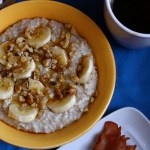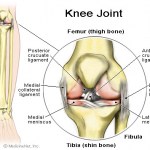Obesity Research
Image by thebittenword.com
Last year I posted results from a study which suggest that having a breakfast high in fibre may be more satiating for a smaller number of calories, and thus may be one important way to help manage hunger and thus caloric intake. Today I came across another new study which suggests that a breakfast high in fibre and with a low glycemic index (the degree to which an ingested food causes a spike in blood glucose levels) may enhance fat oxidation during a subsequent bout of exercise.
In this small study published in the Journal of Nutrition, 8 young and sedentary…
When many people set out to exercise, they do so with the primary goal of losing fat mass. There is much advice floating around about how to optimize or maximize fat loss during exercise; one of the most commonly touted is that of the fat burning zone. Essentially, it is suggested that when performing aerobic exercise (walking, jogging, swimming, etc.) one should work at a fairly low intensity - the fat burning zone - to augment fat oxidation and thus fat loss (pictured above). The fat burning zone target exercise intensity varies from source to source but is approximately 50-60% of your…
Image by shanevaughn
Today is the first day of summer vacation here in Ontario, and I assume that the summer break has begun in most other parts of North America as well. That means that millions of kids are looking at 8 gloriously school-free weeks in July and August. Now while physical activity promotion folks like myself would hope that all of these kids are going to spend their summer outside being physically active, there is plenty of evidence to suggest that that is not the case for most kids.
Since these are kids, parents obviously have a huge amount of control over…
By now, readers of Obesity Panacea have hopefully learned that excess weight is not directly predictive of health risk, and that excess fat mass is not in itself unhealthy. Recall that approximately 30% of individuals who are classified as obese by their body weight turn out to be metabolically healthy, and in fact seem not to get much metabolic benefit (or may even get worse) when they lose weight. Also consider that individuals who have NO fat tissue (e.g. lipodystrophy) have extremely elevated metabolic risk factors, meanwhile others who can apparently indefinitely grow more fat mass (…
Image by thienzieyung
Most people know that consuming too much fat, and especially saturated fat, is bad for your health. That's why there has been a concerted push for several decades to get people to reduce the amount of saturated fat that they consume, and to replace it with complex carbohydrates. Now unfortunately people often misinterpret that to mean that fat is evil, but carbs are ok. This is problematic since consuming too many simple carbs is also likely to increase the risk of obesity, diabetes, and cardiovascular disease - exactly what we are trying to prevent in the…
While we regularly post lengthy discussions on Obesity Panacea, there are many research updates, news stories, videos, etc. in the field of obesity, physical activity and nutrition that we come across on a daily basis that never grace the pages of the blog. Most of these mini-stories we share with our followers on Twitter, and we encourage those of you with active Twitter accounts to communicate with us there to get real-time updates of all the stuff we are discussing (Follow Peter and/or Follow Travis). For those of you who shy away from Twitter, enjoy below the best mini-stories that we…
Does this look "normal" to you?
A significant number of overweight and obese individuals believe their body weight to be appropriate or normal and are satisfied with their body size. Misperception of overweight status is most common among the poor vs wealthy, African Americans vs white Americans, and men vs women. The unfortunate consequence is that overweight individuals who perceive themselves to be of normal weight are less likely to want to lose weight in contrast to overweight individuals with accurate perceptions. Such individuals are also more likely to smoke, have a poor diet,…
The following post was originally published on Obesitypanacea.com on October 7, 2009.
As many of our readers know, I performed my MSc under the direction of Dr Bob Ross at Queen's University (Peter recently completed his PhD in the same lab). Dr Ross is a world leader in the measurement of body fat and body fat distribution, which is why many of our publications focus on the associations of various body fat depots with markers of metabolic risk. During my time at Queen's I was also fortunate to work with Drs Jen Kuk and Lance Davidson (now at York and Columbia respectively),…
Image by MikeBaird.
Last week ParticipACTION and the Canadian Society for Exercise Physiology (CSEP) released recommendations for updated Canadian Physical Activity Guidelines. The previous guidelines were released between 1998 and 2002, and although they were based on the best research available at the time, from what I understand there simply wasn't a tremendous amount of evidence to draw on in some situations. Since then there have been a number of advances in physical activity research, allowing for the creation of updated, and increasingly evidence-based guidelines. …
The Toronto Charter for Physical Activity
As many of you know, I spent last week attending the 3rd International Congress on Physical Activity and Public. It. Was. Awesome! I've been to 5-6 conferences since I started grad school in 2006, and they've all been good experiences, but this one was by far the best. And of the more seasoned researchers that I've spoken to, they all seem to rank it among the best they've attended as well. Unfortunately I wasn't able to liveblog the conference as I'd hoped (the wifi was pricier than I'd expected) so I thought I'd recap…
While I have covered the literature on the "health protective" effect of lower body adiposity and have previously discussed my original paper investigating the effect of losing lower body fat on metabolic health, along with Dr. Jennifer Kuk, I just published a letter to the editor at the International Journal of Obesity discussing some of the limitations of a recent review in the area. Rather than yet again writing about lower body fat and why losing it during weight loss may or may not be bad for your health, Travis and I decided to try our hand at the first of what we hope to be many…
Given that I have put myself out of commission due to a musculoskeletal injury I acquired over the weekend, I thought a discussion of joint injuries and such would be most appropriate in my Robaxocet induced state.
Just last week Travis discussed the issue of injuries associated with exercise among obese individuals. In that post, based on recent evidence, Travis concluded:
"...in overweight and obese individuals, exercise (in the form of walking) has little or no association with injury or illness."
However, there still remains the issue of various musculo-skeletal problems which appear to…
Image by Randy Son of Robert.
I love simple physical activity interventions. We all know that physical activity is a good thing, and yet it can be really difficult for people to increase their physical activity levels, especially over the long-term. So it's exciting whenever any intervention is shown to be effective, but even more so when it is simple. And an intervention that is both simple and inexpensive is pure gold. I wrote about one such intervention a few weeks ago, when I described a British study that showed that simply painting lines on a school-yard…
Image by Jespahjoy.
Just before moving to our new home here on Scienceblogs, I asked our readers for ideas on what types of content they would like to see here on Obesity Panacea. One topic that came up several times was the issue of injuries. I'm not sure why we haven't discussed injuries in the past (aside from the fact that it's not the focus of our research), but it was a great idea, and I've come across a study on the topic that I think will be of real interest.
The study is titled "The influence of exercise and BMI on injuries and illnesses in overweight and…
Image by Jeff Keen.
In the past few years several prominent researchers have argued for the adoption of taxes on junk food as a means of reducing their consumption. Often, as in a recent editorial in the New England Journal of Medicine, the argument is made that money collected through the tax could then be used to subsidize healthier foods. This is an idea that I've found very appealing - we make the bad foods more expensive, the good foods less expensive, and people will probably shift at least some of their purchases to those healthier options. But a very…
Nope, not even close, although I doubt it will stop big food from marketing Activia yogurt and others as a solution for expanded waistlines.
According to the World Health Organization, probiotics are:
"Live microorganisms which when administered in adequate amounts confer a health benefit on the host".
Over the past few years there has been a huge surge in the addition of specific probiotic cultures into various fermented milk products, such as yogurt. For the most part the marketing push behind these products has focused on the potential for regulating digestive function (i.e. Jaime Lee…
Well, in fairness, Jesus' twelve Apostles should also share in the blame.
An incredibly quirky and yet fascinating study was just published in the International Journal of Obesity which investigated the size of the food and plates that have been depicted in paintings of Jesus' Last Supper over the last 1000 years.
The trend of gradually increasing portion sizes is well documented; just go to your local McDonalds and order a large drink and fries and drive yourself directly to the nearby hospital for a bypass.
Thus, Wansink & Wansink (maybe a married couple) decided to directly compare…
Over the next few months, Peter and I will be re-posting some of our favourite posts from our Obesity Panacea archives. The following article was originally posted on December 2, 2009.
Image by Mike Baird.
There is a surprising amount of controversy about the ability of physical activity to prevent the development of obesity. Sure, obese individuals tend to perform less physical activity than their lean counterparts, but that doesn't prove causation. And almost every week it seems that there is a news story reporting that the obesity epidemic is caused by diet. Period. If you…
That's right - contrary to what many religiously believe, it is the inability to grow more fat during times of energy surpluss, rather than the excess of fat which appears to directly contribute to the metabolic consequence often associated with obesity.
A recent article in the New Scientist shines some light on this issue;
Obesity kills, everyone knows that. But is it possible that we've been looking at the problem in the wrong way? It seems getting fatter may be part of your body's defense against the worst effects of unhealthy eating, rather than their direct cause.
While the article…
The current recommendations from major health organizations stipulate that if an individual has a BMI in the obese range (>30 kg/m2), they should be counseled to lose at least 5-10% of their body weight. This advice appears to make some sense given that increasing body weight is generally associated with heightened risk of various diseases, and that reduction of body weight usually improves levels of risk factors for disease (e.g blood pressure, triglycerides, etc). However, the literature has been much more complicated in terms of the effect of weight loss on risk of early mortality.…






